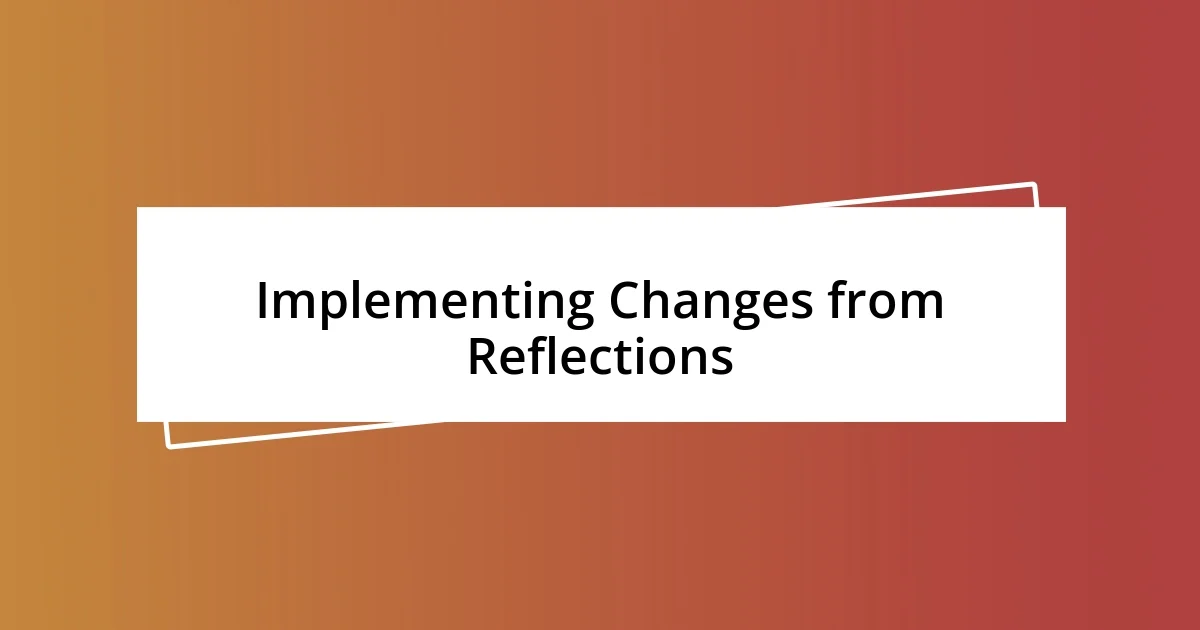Key takeaways:
- Reflecting on the week enhances clarity about priorities, boosts self-awareness, and cultivates gratitude by recognizing small victories.
- Establishing a consistent weekly reflection schedule, ideally on Sunday evenings, transforms the process into a meaningful ritual that allows for deeper insights.
- Sharing reflections with others fosters accountability and new perspectives, and implementing insights from reflections can lead to personal growth and progress.

Benefits of Reflecting on Weeks
One of the most significant benefits of reflecting on my week is gaining clarity about my priorities. When I take a moment to analyze my accomplishments and setbacks, I often find patterns that inform my future decisions. Have you ever realized that the things you spend the most time on aren’t necessarily adding value? I’ve certainly faced that reality, and it pushed me to focus on what truly matters.
Another advantage is the boost in self-awareness I experience. After reflecting, I can identify my emotional highs and lows throughout the week. There was a time when I felt overwhelmed after a busy week, but by assessing my feelings, I understood that I needed to set boundaries. This self-awareness transformed my approach to both work and self-care.
Lastly, reflecting on my week helps me cultivate gratitude. I often find myself acknowledging small victories that I might otherwise overlook, like completing a challenging task or reconnecting with an old friend. Isn’t it incredible how these little moments can shift our perspective? Embracing gratitude in this way allows me to head into the next week with a more positive mindset.

Setting a Weekly Reflection Schedule
Setting a weekly reflection schedule might sound daunting, but I assure you, it’s truly transformative. For me, dedicating a specific time—usually Sunday evening—has become a cherished ritual. I find that by intentionally blocking off this time, I create a calm space to think critically about my week, which is essential for my mental clarity.
I’ve experimented with different frequencies and times. Once, I even tried a daily reflection, but it felt overwhelming. I realized that a weekly deep dive allows me to pull together thoughts on various experiences and emotions, while daily journaling often became a rushed checklist. It’s fascinating how finding the right rhythm can turn reflection from a chore into something rewarding and insightful.
To help visualize the process, I often create a simple table. It lays out the main events of the week, feelings related to them, and any potential lessons learned. This practice guides my reflections and gives me a clear picture of my weeks as they unfold.
| Day | Reflection Focus |
|---|---|
| Monday | Identify strong feelings |
| Tuesday | Achievements |
| Wednesday | Challenges |
| Thursday | Gratitude |
| Friday | Lessons learned |
| Saturday | Set goals for next week |
| Sunday | Summarize insights |

Methods for Weekly Reflection
Reflecting on my week has become an essential part of my routine, and I’ve found several methods that truly resonate with me. One of my favorites is journaling my thoughts each Sunday afternoon. I pour my feelings onto the pages, recalling moments that stood out, both good and bad. I remember a week when I felt particularly disheartened, and writing it down allowed me to express those feelings, ultimately leading to a realization that I needed to shake things up in my life. That cathartic release not only lifted my spirits but also helped me strategize my upcoming week with a clearer mind.
Here are some methods I employ for weekly reflection:
– Journaling: Writing down my thoughts and feelings to process the week.
– Mind Mapping: Creating visual diagrams to connect experiences and emotions.
– Voice Notes: Recording my reflections on my phone when I’m on the go.
– Meditation: Spending a few minutes in quiet contemplation to clear my mind.
– Discussion: Engaging in conversations with friends or family about my week for different perspectives.
– Goal Setting: Outlining actionable steps based on my reflections to guide the upcoming week.
Each of these methods adds a unique layer to my reflective process, helping me stay grounded and focused on what truly matters to me.

Journaling Techniques for Reflection
Journaling has become my sanctuary for reflection, and I often use prompts to guide my thoughts. For instance, a compelling prompt like “What was the highlight of my week?” really makes me pause and savor the moments that brought me joy. I remember a time when I had an exhilarating outing with friends; writing about it afterward not only captured the memory but also reminded me of the importance of nurturing those connections. Questions like this open a window into my emotional landscape, much like a trusted friend would.
Another technique I love is the “Three Good Things” approach. At the end of each week, I jot down three positives that happened, no matter how small they seem. One week, I noted that I found a delicious new coffee shop and had a meaningful conversation with a co-worker. Reflecting on these gold nuggets shifts my mindset and helps me cultivate gratitude. Have you ever stopped to appreciate those tiny moments? They often reveal that even in challenging weeks, there’s light breaking through the clouds.
Visual journaling is another method that resonates deeply with me. I sometimes incorporate doodles or sketches alongside my words, which I find helps articulate feelings that words alone can’t express. I recently drew a chaotic swirl to represent a particularly stressful week at work, and then right next to it, I illustrated a calm beach scene to symbolize my desire for peace. This combination of imagery and writing not only provides clarity but also serves as an emotional release. Isn’t it fascinating how creativity can play a pivotal role in our reflections?

Questions to Ask During Reflection
Asking the right questions can vastly enhance your weekly reflection. For instance, I often reflect on “What challenges did I face, and how did I respond?” This prompts me to assess my reactions and identify patterns. I recall a week filled with unexpected tasks at work, and asking this simple question revealed that I often felt overwhelmed instead of seeking help. It was an eye-opener that encouraged me to communicate better with my team.
Another question I find enlightening is, “What did I learn about myself this week?” This inquiry digs deep into personal growth and helps me uncover insights that might otherwise go unnoticed. One week, I realized I had a tendency to shy away from conflict, prompting me to engage in conversations that felt uncomfortable but were necessary for my growth. Have you ever considered how your personal responses shape your week? Reflecting on this can be a crucial step in your journey.
Lastly, I frequently ask myself, “How did I contribute to my goals?” This question helps keep me aligned with my long-term aspirations. I once found myself drifting from a project I was passionate about due to day-to-day distractions. By recognizing this and committing to specific actions, I was able to reignite that passion. Have you ever felt that flicker of motivation waning? Taking time to evaluate your contributions can reignite that flame and bring back your focus.

Sharing Reflections with Others
I’ve found that sharing my weekly reflections with close friends can be a game changer. When I recount my experiences, I not only reinforce what I’ve learned, but I also gain new perspectives. Just last week, I shared a challenging situation at work where I felt unappreciated. My friend offered an alternative viewpoint that helped me see the positives in my contributions, prompting me to focus more on what I can offer rather than what I lack.
Talking about my reflections also brings a sense of accountability. When I express my goals to others, it solidifies my commitment to them. I remember discussing my intention to start exercising regularly. The moment I shared it, I could feel the weight of that promise—I wasn’t just accountable to myself anymore; I had a support system cheering me on. Does this kind of support resonate with you? It strengthens my resolve and often ignites a deeper motivation within me.
One practice I’ve found valuable is hosting a small reflection group. We gather weekly and take turns sharing our highlights, challenges, and learnings. It’s truly uplifting to hear how others process their weeks. I vividly recall one night where a group member shared a minor victory at work that they initially dismissed. Their pride radiated through the room, and it reminded us all of the importance of celebrating even the smallest wins. Could there be a more inspiring way to connect and grow together? It’s experiences like these that reinforce the beauty of shared reflections.

Implementing Changes from Reflections
Reflecting isn’t just about examining the past; it’s about implementing changes for the future. For example, after identifying my tendency to avoid confrontation, I approached a coworker I had been avoiding. The conversation felt daunting at first, but it turned out to be constructive. Seeing the situation through a different lens was not only empowering but also created a stronger collaboration moving forward. Have you ever been surprised by the outcome of a conversation you were dreading?
Once I realize the habits I want to change, I take small, actionable steps to integrate those changes into my routine. I remember a week where I noted my procrastination on personal projects. In response, I dedicated just 15 minutes a day to those projects. Surprisingly, those brief sessions ignited a spark within me. It’s fascinating how even the smallest commitment can cultivate significant progress, don’t you think?
I’ve found that tracking my progress through journaling enhances accountability. Each week, I jot down specific changes I intend to make and how they align with my goals. Looking back through my journal allows me to see the progress I’ve made. There’s a gratifying feeling in realizing that my reflections have led to tangible growth. Can you recall a moment when you felt proud of your improvements? That pride validate all the efforts I’ve put in to evolve.











